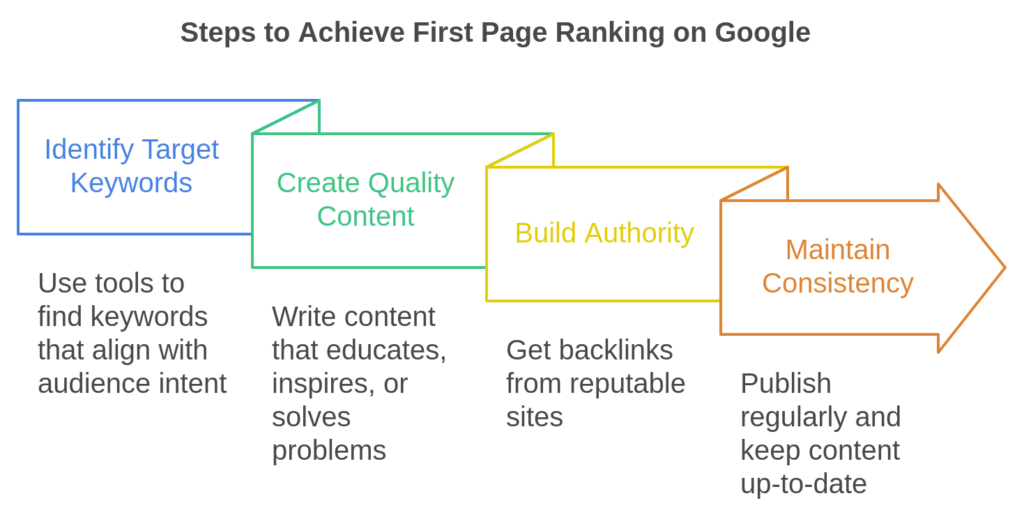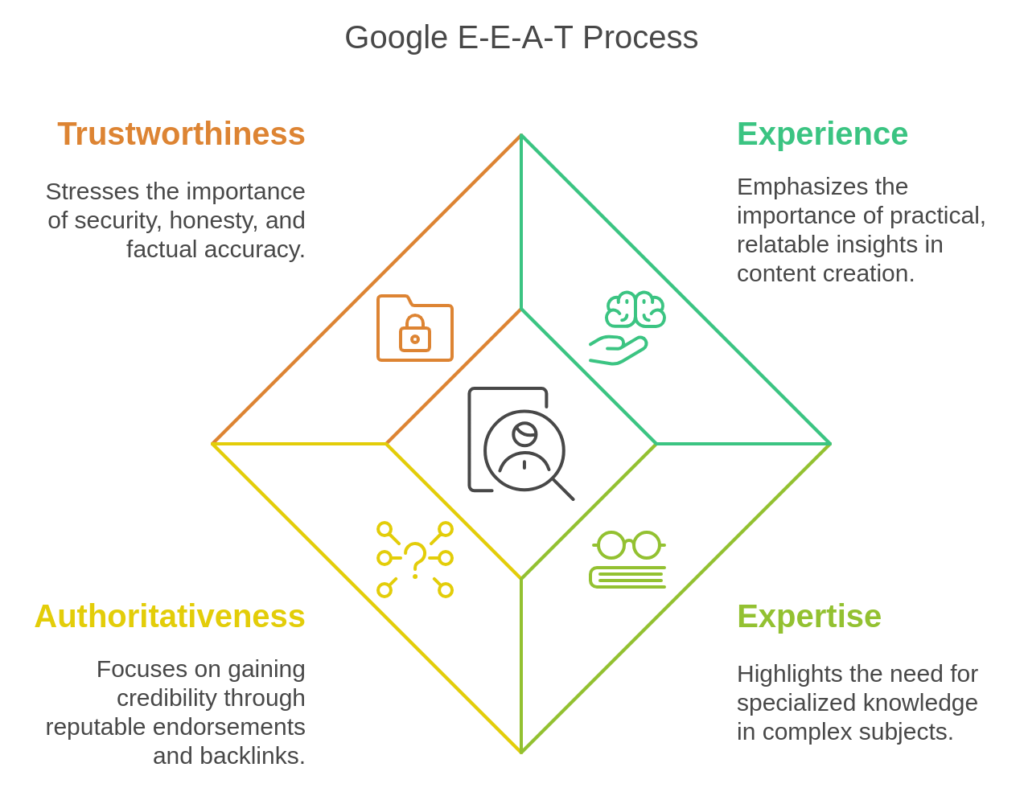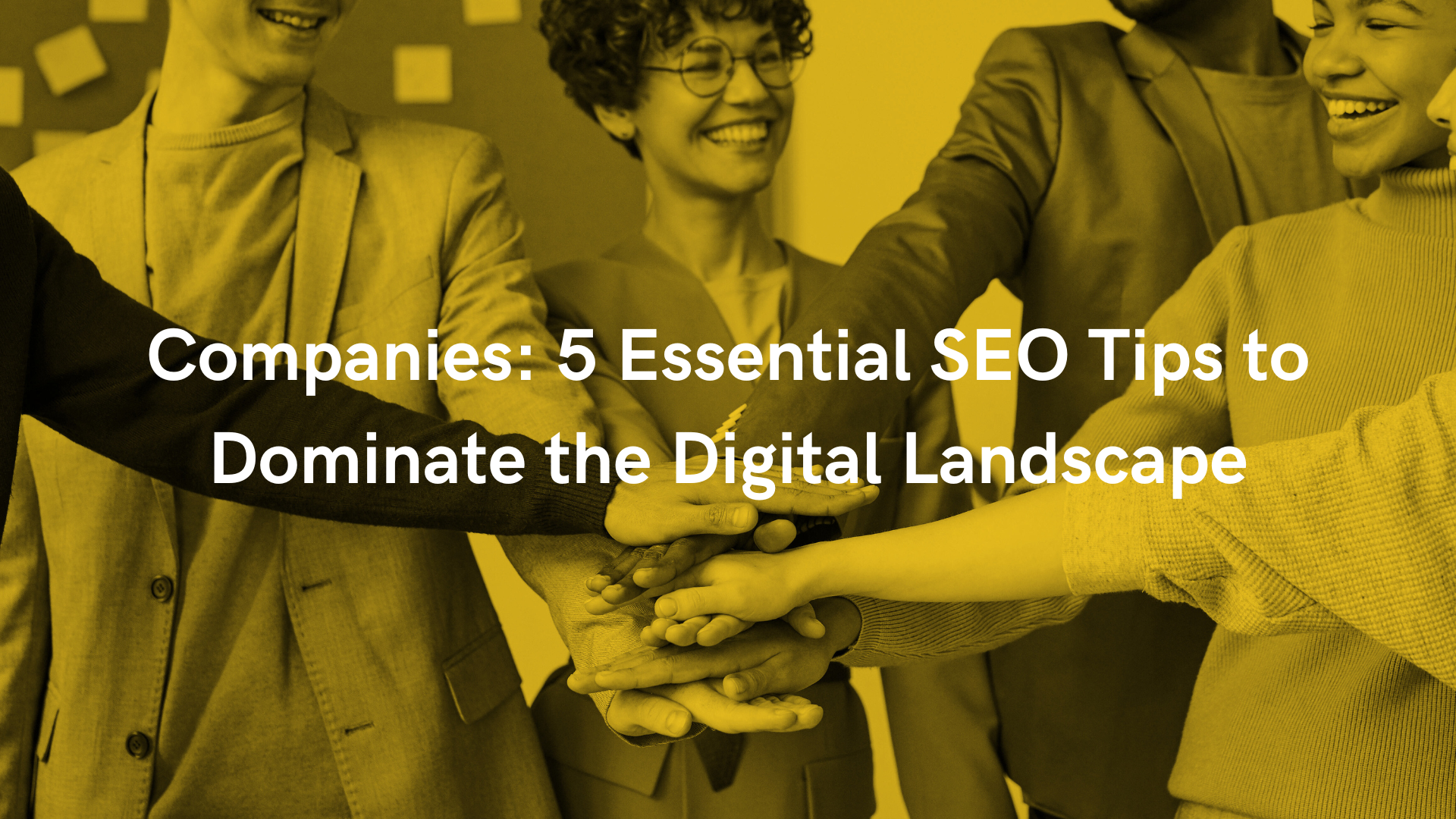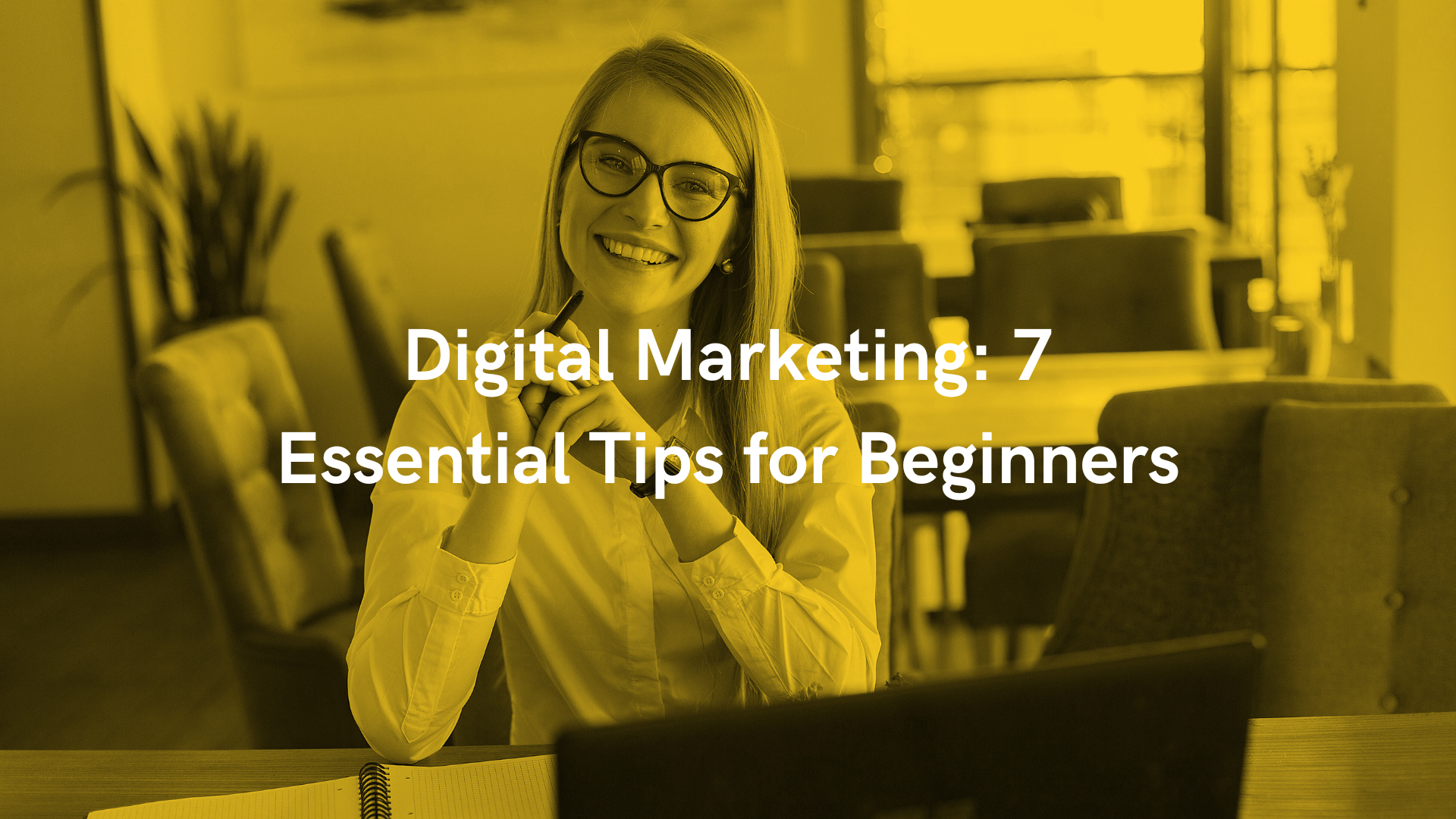Google SEO is a topic everyone who wants their website on the first page should understand. Drawing from my four years of experience as an SEO copywriter, I’ll break it down for you in simple terms.
I’ll guide you through how Google SEO works, explore the differences between Google Ads and SEO, and share the ultimate recipe to appear on Google’s first page. Ready? Let’s dive in!

Google SEO: 10 Key Tips for Businesses to Dominate Search
How Does Google SEO Work?
Picture Google as the librarian of the internet. Its job is to organize an overwhelming amount of information and show you the most relevant results. Now imagine you’re writing a book and want it to be the first one the librarian recommends.
That’s where SEO comes in—making sure your “book” is well-written, highly recommended, and easy to find. Google SEO relies on three main pillars:
- Keywords: These are the words or phrases people type into Google. Think of them as the “language” of search. If someone searches “best Korean language courses,” Google looks for websites with content that matches those words.
- User Experience (UX): Google ranks sites that load quickly, look good on mobile, and provide helpful content. Think of it like a game interface—smooth, intuitive, and engaging wins every time.
- Authority: Google wants to recommend trusted sources. If other reputable websites link to yours, it’s like getting good reviews from fellow authors.
So, what does this mean for you? It means creating content people love, optimizing your website, and building relationships with other websites. Sounds simple, right? Not quite—but that’s where the tips below come in!
Google SEO 2024: 10 Essential Tips for Businesses to Dominate Search
Now that you understand Google SEO, you can explore ten essential tips for businesses to dominate search.
Choose Keywords and Start With Content That Connects With Each Other
Think about the last time you searched for something. Did you type one word, or a phrase like “best running shoes for beginners”? Most likely, it was the latter.
Research long-tail keywords (phrases with three or more words) that match what your audience is searching for.
Then, create interconnected content that flows naturally, like episodes in a good anime. If one blog post is the “origin story” of your topic, link it to the “sequel” that dives deeper. Click here to see my content about how to do keyword research, it’s a full guide in 3 steps!
Your Content Needs to Finish the Research
Imagine watching a movie trailer that promises action, but when you see the film, it’s all boring dialogue. Frustrating, right? I mean, I love a good drama, but you need to go in with that in mind.
That’s how users feel when they click on a website that doesn’t answer their questions. Write content that fully answers the user’s intent.
For example, if someone searches “how to run a 5k,” your article should cover training tips, gear, and a beginner’s running plan. Leave no question unanswered.
Optimize for Mobile Users
Have you ever tried reading a novel on your phone, but the text kept shrinking and jumping around? That’s what a poorly optimized website feels like to users.
And here’s the thing: Google prioritizes mobile-friendly sites. After all, there are more smartphones than people in the US.
Use responsive design to ensure your site looks great on all devices. Keep navigation simple, and make buttons big enough to tap easily—because nobody wants to deal with tiny links.
Keep in Mind That SEO Is a Long-Term Game
Here’s the harsh truth: Google SEO isn’t instant. It’s like learning a new language. You won’t become fluent overnight, but consistent effort pays off—I took three years to learn English.
When I started freelancing, I expected quick wins, but real growth came from months of refining my skills and building a portfolio.
SEO is the same. Be patient, track your progress, and trust the process. If you want more about why SEO is important, we have another article with 7 reasons why matters
Monitor Your Performance
Think of SEO as a journey. Would you go on a road trip without checking your map occasionally? Monitoring your performance is how you ensure you’re on the right track.
Use tools like Google Analytics to track metrics like traffic, bounce rate, and keyword rankings. If something’s not working, tweak your strategy.
Hire an SEO Copywriter
Let me tell you: writing persuasive content that ranks well is an art and a science. A skilled SEO copywriter can help you craft engaging articles, product descriptions, or landing pages that both Google and users love.
If you’re short on time or expertise, consider hiring a pro. Trust me, it’s worth the investment because you won’t face the mistakes you might make as a beginner. If you want more about what are the key elements of SEO and why are they important, we have another article about this. Click here to read it!
Build Backlinks
Backlinks are like reviews for your site. The more high-quality backlinks you have, the more credible Google thinks you are.
Reach out to industry blogs, offer guest posts, or collaborate with influencers. For example, if you sell running gear, a review from a fitness blogger can boost your Google SEO and sales. Still too complex? Click here to see the other content that I just explained about technical SEO: What is it in simple terms?
80% Informational Content and 20% Transitional Content
When creating content, think about balance. Informational content educates your audience, while transitional content guides them toward a purchase or action.
For instance, if you’re a language tutor, 80% of your blog could be tips like “How to Memorize Vocabulary Fast,” while the remaining 20% promotes your tutoring services.
Improve Your Page Speed
Page speed is critical. Slow websites lose visitors faster than you’d drop a poorly written novel. Compress images, minimize JavaScript, and use a reliable hosting service. Tools like Google PageSpeed Insights can help you identify what’s slowing your site down.
Make Evergreen Articles
Evergreen content stays relevant over time, like the classic charm of Pulp Fiction. While trending topics fade, evergreen articles continue to attract traffic.
Focus on timeless topics. For instance, a guide on “Google SEO Basics” will remain valuable for years, while “SEO Trends for 2024” might lose relevance in 2025.
What is Google Ads and SEO?
Now, let’s clarify a common confusion: Google Ads vs. SEO. If SEO is like training for a marathon—slow but rewarding—Google Ads is like taking a taxi to the finish line.
Ads give you instant visibility, but only while you’re paying. SEO, on the other hand, builds long-term traffic. My advice? Use Google Ads for short-term goals, like launching a new product, and Google SEO for sustainable growth.
How to Appear on the First Page of Google

The golden question! Landing on Google’s first page takes effort, but it’s achievable with the right strategy:
- Target the Right Keywords: Use tools to find keywords that align with your audience’s intent.
- Focus on Quality Content: Write content that educates, inspires, or solves problems.
- Build Authority: Get backlinks from reputable sites.
- Be Consistent: Publish regularly and keep your content up-to-date.
Think of SEO as crafting a compelling story. Your job is to make it so engaging that neither Google nor your audience can ignore it.
The most important thing is to be consistent—over time, you will get there if you follow these guidelines and tips. Click here to check out my content on local SEO. I’ve written the ultimate guide for 2024 with everything you need to know.
Google E-E-A-T Process: What Does It Mean for Your Business?
When I first started diving into SEO, I quickly realized that it wasn’t just about cramming keywords into content—there’s much more to it.

This is where Google’s E-E-A-T process comes in. To simplify, think of Google as a super-sleuth detective like Batman, determining which websites are trustworthy and valuable for its users. E-E-A-T is the detective’s code.
If you can master and follow this code, Google will eventually find you. However, don’t forget what I just mentioned—SEO is a long-term game.
Experience
Google wants content created by people who not only know the theory but also have practical experience with the topic. For example, if you’re writing about fitness, a certified personal trainer’s insights will be more valuable than a general article.
My advice? If you’re in a niche, share personal stories and experiences. It’s like running a marathon—people can relate to your struggle and growth.
Expertise
Content should come from experts, especially on complex subjects. This is essential for industries like finance or health.
Think about it—if you needed legal advice, you’d want it from a lawyer, not someone who’s just read about the law, right? For businesses, collaborating with industry experts or showcasing your credentials can help improve credibility.
Authoritativeness
Authority is about who’s backing up your website. High-quality backlinks from reputable sites can significantly improve your authority.
This is like getting endorsements from well-known figures in your field. When I started freelancing, getting backlinks from established platforms helped me climb the ranks. My tip for you? Reach out to industry influencers or write guest posts on respected websites.
Trustworthiness
Trust is the backbone of Google SEO. Google favors websites that are secure, honest, and transparent. If your site has an SSL certificate, that’s a great start, as it signals to Google that your site is secure.
But beyond that, make sure your content is factual, transparent, and accurate. For instance, when writing product descriptions, I always ensure they are not only persuasive but factual.
Did you like our content about Google SEO? Share it! And don’t forget to check out the brand-new articles we have on the blog to learn more and achieve the best results with your website.



























![How to make a headline? [Learn Copywriting in 3 steps]](https://matheusxaviercopy.com/wp-content/uploads/2024/11/Picsart_24-11-08_23-10-34-695-scaled.jpg)
![What is off-page SEO for website? [Understand in 1 minute]](https://matheusxaviercopy.com/wp-content/uploads/2024/11/Picsart_24-11-05_09-49-51-640-scaled.jpg)
![Content and SEO: Why do technology companies need it? [2024]](https://matheusxaviercopy.com/wp-content/uploads/2024/10/Picsart_24-10-15_17-25-02-236-scaled.jpg)


![SEO: What are the key elements? [Understand in 30 seconds]](https://matheusxaviercopy.com/wp-content/uploads/2024/10/Picsart_24-10-09_11-57-22-785-scaled.jpg)
![SEO: What is it in simple terms? [Understand in 30 seconds]](https://matheusxaviercopy.com/wp-content/uploads/2024/09/Picsart_24-09-10_11-16-03-082-scaled.jpg)


